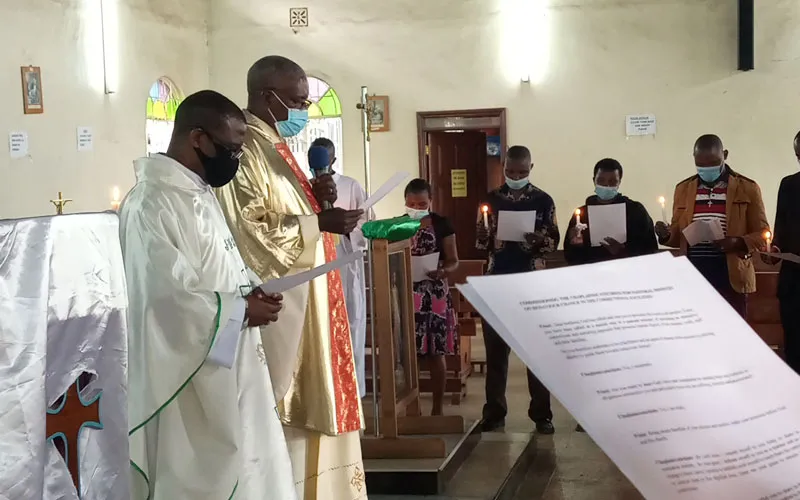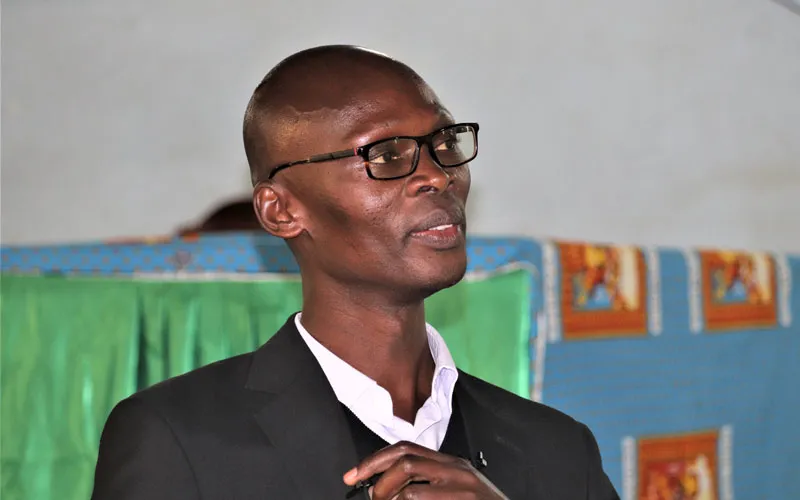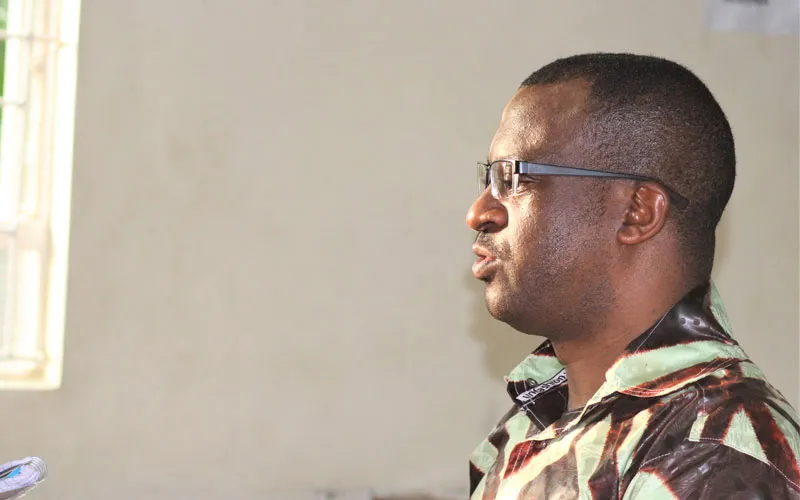Representatives in the training that targeted the Nairobi region were drawn from Lang’ata Women’s Prison, Nairobi West Prison, Industrial Area Remand and Allocation Prison, Kamiti Maximum Prison, Kiambu Prison, Ruiru Prison and Prison Staff Training College. Juvenile correctional facilities were represented by Catechists from Kamae Girls and Kamiti Prison’s Youth Corrective and Training Centre.
Developed in 2012 to address the HIV/AIDS challenge among the youth through the AJAN HIV and AIDS Prevention Program for the Youth (AHAPPY Generation), the training has since evolved to include the inculcation of values among young people and to guide them in their interpersonal relationships.

Fr. Matambura tells ACI Africa that today, the AHAPPY Generation training manual not only provides means of fighting HIV infections, but also seeks to enable the young people to be in control of their lives, promote responsible decision making for their future and reach out in compassion to others.
He says that in response to one of the Jesuits’ Universal Apostolic Preferences in which members of the Society of Jesus seek “to accompany the young in the creation of a hope-filled future,” the Religious Order is paying special attention to vulnerable young people.
(Story continues below)
“Among the often-forgotten young people are refugees, migrants and youth in prison and correctional facilities,” Fr. Matambura says, and adds, “These youth, given their situation are most exposed to many forms of exploitation and abuse, by consequence, to diseases, self-doubt, hopelessness, and lost dreams.”
The native of the Democratic Republic of the Congo (DRC) says that the journey of accompanying the youth in prison through AHAPPY program, in collaboration with the Catholic chaplaincy, started in 2019 with training of youth leaders from various prison chapels and parishes in the Nairobi region.
Those trained in the Training of Trainers (ToT) program were children of the prisons’ officers and these were to reach out to their fellow youth serving prison terms and those committed to correctional facilities in their respective commands.
The Jesuit Priest says that with COVID-19 pandemic, youth-to-youth interactions became difficult. Family visits of inmates was also prohibited, adding to the frustrations of the young inmates.
The ongoing ToT was organized for pastoral Agents, the Catholic Catechists responsible for the spiritual formation of the young people in prison under their care, Fr. Matambura says.
“The main aim of the AHAPPY ToT is to form the catechists and provide them with more tools to be agents that seek to engender an alternative approach to correction for the youth that promotes human dignity,” the Congolese Priest says.
It is one of the ways through which the Society is marking the 500th anniversary of conversion of their founder, St. Ignatius of Loyola.
“The Ignatian principle of cura personalis which implies a genuine love and personal care for the young is what AHAPPY is about,” Fr. Matambura says, and explains, “It approaches the integral formation of the young person through the Ignatian paradigm that gives pre-eminence to the constant interplay of Experience, Reflection and Action.”
He says that the result of the training is “a whole-rounded youth who lives and grows to the best of their ability, and who work for the good of others and improvement of their continent.”
“In the context of youth who are in conflict with the law, the society and with themselves, the effort of seeing all things anew in Christ impels us to see the young person behind bars, not as defined by their current state but as a human person, beloved creature of God, with dreams, talents, hopes and the capacity to realize them,” the Jesuit Priest says, making reference to St. Ignatius of Loyola’s mantra, “to see all things new in Christ.”
The manual, which has been developed into a 232-page book has three topics that guide users through self-awareness and discovering God’s purpose in their lives. In the second part, the users get to appreciate their surroundings and learn how to relate with each other and finally, in the third part, they get the values and skills to cope in their difficult environments.
“The aim of the manual is to help young people to lead happy lives in whatever environment they find themselves in,” Fr. Matambura says, and adds, “It is about learning to live happily in a broken society, caring for others and not exploiting them.”
“In the world of prison, there are people who have wounded the society and in turn, gotten themselves wounded. The aim of the manual is to help the person in jail not to be overwhelmed by all the hatred there is in society,” the Priest says.
In an interview with ACI Africa on the sidelines of the event, the National Chaplain of the Kenya Prisons Services, Fr. Peter Kimani, lauded the AJAN training, underscoring the need for Prison Catechists to change with time to address the evolving challenges affecting the youth.

The member of the Clergy of Nairobi Archdiocese highlighted issues such as defiance against parents, drugs and substance abuse, peer pressure, materialism as well as ethical issues related to the Internet and digital technology as some of the issues that young people deal with today.
“All the issues that affect young people out there are what their counterparts locked behind bars deal with, especially where there is no spiritual guidance and a strong emotional support,” Fr. Kimani told ACI Africa Thursday, June 24.
He said that the training by members of JCAM was relevant to the Prisons, a place that he said was suitable for instilling values in the youth.
“Prison can be a very good place for behavior change especially among the youth. Here, we have all the time to handle the conduct of the inmates before they go back to the society,” the Priest who stands in for the Catholic Church at the Kenya Prison Services said.

Coordinating 120 Prisons around the East African country, Fr. Kimani’s office ensures that prisoners access Church services. His office ensures that there is at least one Catechist in every Prison who meets the inmates’ pastoral needs and identifies the nearest Parish Priest to celebrate Mass within the Prison.
Fr. Kimani expressed optimism that the Jesuits’ training, which had been piloted in the Nairobi region, would be spread to other Prisons across the country.
Beneficiaries of the AJAN training said they were enthusiastic about the training, with Catechist Ekamuran expressing his eagerness to organize the population of over 2,000 prisoners at Kamiti Maximum Prison into manageable groups for easy training.
Ms. Makola also expressed her enthusiasm to start dealing with the boys at Kamiti’s correctional centre more efficiently.
“Many boys in the juvenile prison are brought in for stealing and rape and most times, we look at their crimes at face value. Hardly ever do we look at the root causes of these behaviors,” Ms. Makola said.

She added, “From this training, I have learnt to dig deep into a child’s background and understand where they are coming from. It is also my duty to teach the boys about appreciating themselves and learning how to relate with other people.”
Benson Wanzala, a Constable Officer and Catechist at Jamhuri Short Sentence (SS) Prison who has started a Small Christian Community (SCC) named St. Anthony of Padua to serve the Catholic population at the Prison said that the knowledge from the training and the manual given at the commissioning of the Prison Catechists would be a great boost to his vision for the Catholic community in the prison.
“When I came to Jamhuri Prison, there was no specific place for Catholics to worship. They would join Protestant Churches within the Prison premises but now, we have a small Christian community. The only challenge we have is getting materials for instruction,” Officer Wanzala said, and added that he was rallying for funds to construct a Church in a piece of land that had been allocated for the Catholic Church within the institution.
Agnes Aineah is a Kenyan journalist with a background in digital and newspaper reporting. She holds a Master of Arts in Digital Journalism from the Aga Khan University, Graduate School of Media and Communications and a Bachelor's Degree in Linguistics, Media and Communications from Kenya's Moi University. Agnes currently serves as a journalist for ACI Africa.














